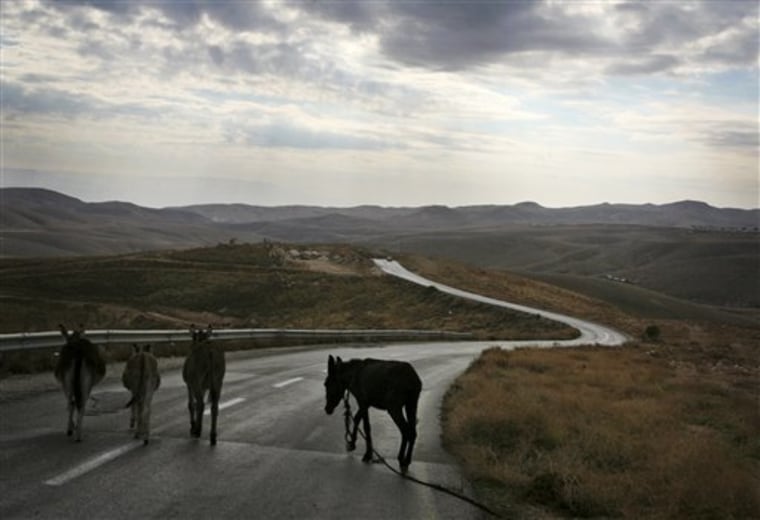WADI QELT, West Bank — Gazelles, hyenas and foxes drink from the eucalyptus-lined stream that flows through this West Bank desert canyon. But the separation barrier Israel is building to keep out Palestinian attackers threatens to cut the animals off from this vital water source.
Fearing for the environment, an unusual mix of Jewish settlers and Israeli and Palestinian activists have joined forces to stop the barrier from pushing through this sensitive area east of Jerusalem, saying the pristine landscape and wildlife in Wadi Qelt could suffer irreversible damage.
"This is the first time in the history of the land of Israel in which you take land that has been one land ... geographically and naturally, and divide it with a physical barrier that is meant to prevent the passage of anything larger than a rat," said Avraham Shaked, regional coordinator in Jerusalem for Israel's Society for the Protection of Nature. "This damages the connectivity that is one of the elements that many species rely on."
The environment issue is providing rare common ground for adversaries who each oppose the barrier for their own reasons — Palestinians because they think it usurps land they want for a future state, and Jewish settlers who see it as a precursor to giving up the West Bank. In any peace deal, Israel would likely relinquish the more than 90 percent of West Bank land that is expected to lie outside the barrier.
The 490 miles of concrete walls and electronic fence are two-thirds complete. Soon, Israel intends to lay a 7.5-mile stretch of fence that will crisscross Wadi Qelt, destroying the canyon that cuts deep into the rocky Judean Desert near the Dead Sea.
John the Baptist site
From biblical times, monks, prophets and Jewish rebels fleeing the Romans sought refuge in Wadi Qelt's caves and drank from its natural springs. They shared the desert with leopards, wolves and eagles. John the Baptist reputedly lived and preached here.
Now the area is one of the few open spaces left in the region where wild animals still roam freely.
But their freedom and survival are in jeopardy, environmental activists say. Wadi Qelt lies in one of the most contested regions in the Israeli-Palestinian conflict. Israel hopes to hold onto the area in any peace deal with the Palestinians and plans to extend the barrier to encompass the nearby Maaleh Adumim settlement bloc. The loop feeds Palestinian suspicions that the barrier is a cover to grab West Bank land they want for a state.
Wildlife advocates, warning that it destroys feeding grounds and water sources, have won court orders suspending work on several sections. Openings that have been created in the fence for animals aren't even big enough for a fox, they say.
Now, the naturalists are asking authorities to use surveillance cameras instead of physical obstacles to secure the Wadi Qelt section.
'Protect our nature'
The campaign has brought together people with conflicting agendas and views.
Imad Atrash, executive director of the Palestine Wildlife Society, says it's tough to persuade Palestinians to worry about wild animals at a time when the barrier is making it hard, if not impossible, for thousands of people to reach their farmlands, jobs and services. He says he appeals to their patriotism, telling them "we are going to protect our nature for the Palestinians."
He and other Palestinians work with Israeli specialists to track threatened animals, like the lesser kestrel, a small falcon that nests in Wadi Qelt's cliffs.
Israeli environmentalists also had few backers when construction of the barrier began in 2002. Security officials say it brought a dramatic drop in deadly bombings, and Israelis overwhelmingly support it.
But some Jewish settlers from Kfar Adumim, overlooking Wadi Qelt, see the barrier's threat to nature.
Settler Roee Simon, an environmental activist, watched two gazelles graze on new winter grass and predicted that construction there "will destroy it all."
When it comes to opposing the barrier, he said, "I agree with the Palestinians."
Animals rely on water
In the Wadi Qelt area, the barrier's proposed route would encompass the stream's main spring, where turquoise-winged kingfisher birds hunt fish. Animals on the West Bank side would be cut off from the water.
In the Wadi Fukin area of the central West Bank, the Israeli-Palestinian branch of Friends of the Earth has persuaded Israel's Supreme Court to halt work on the barrier, arguing that natural springs would be destroyed.
Wadi Fukin's 3,000 Arabs need the springs to irrigate their parsley, radishes and beans. Dozens of wild animals also rely on this water, said farmer Mohammed Manasra, 60.
"We want the gazelles and the porcupines to wander our land as they always have," he said.
